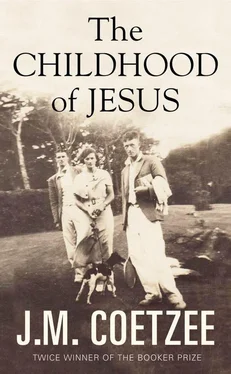Back in their room at the Centre he slices an apple for the boy and peels an orange. While the boy is eating these he cuts a carrot and a cucumber into slim cartwheels and lays them out on a plate. ‘There!’ he says.
Suspiciously the boy prods the cucumber, sniffs it. ‘I don’t like it,’ he says. ‘It smells.’
‘Nonsense. Cucumber has no smell at all. The green part is just the rind. Taste it. It’s good for you. It will make you grow.’ He eats half the cucumber himself, and a whole carrot, and an orange.
The next morning he revisits Naranjas and buys more fruit — bananas, pears, apricots — which he brings back to the room. Now they have quite a stock.
He is late for work, but Álvaro does not remark on it.
Despite the welcome additions to their diet, the feeling of bodily exhaustion does not leave him. Rather than building up his strength, the daily labour of lifting and carrying seems to be draining him. He is beginning to feel quite wraithlike; he fears he is going to faint in front of his comrades and shame himself.
He seeks out Álvaro again. ‘I’m not feeling well,’ he says. ‘I haven’t been feeling well for a while. Is there a doctor you can recommend?’
‘There is a clinic on Wharf Seven that is open in the afternoons. Go there at once. Tell them you work here; then you won’t have to pay.’
He follows the signs to Wharf Seven, where there is indeed a little clinic, called simply Clínica . The door is open, the counter unmanned. He presses the buzzer, but it does not work.
‘Hello!’ he calls out. ‘Is anyone here?’
Silence.
He crosses behind the counter and raps on the closed door marked Cirugía . ‘Hello!’ he calls.
The door opens and he is confronted by a large, florid-faced man in a white laboratory coat on whose collar there is a lush smear of what looks like chocolate. The man is sweating heavily.
‘Good afternoon,’ he says. ‘Are you the doctor?’
‘Come in,’ says the man. ‘Sit down.’ He indicates a chair, removes his glasses, wipes the lenses carefully with a tissue. ‘Do you work here at the docks?’
‘On Wharf Two.’
‘Ah, Wharf Two. And what can I do for you?’
‘For the past week or two I have not been feeling well. There are no specific symptoms except that I get tired easily and now and again have dizzy spells. I think it is probably because of my diet, the lack of nourishment in my diet.’
‘When do you have these dizzy spells? At any particular time of day?’
‘No particular time. They come when I am tired. I work as a stevedore, loading and unloading, as I told you. It is not work I am accustomed to. In the course of a day I have to cross a gangplank many times. Sometimes as I look down into the space between the quay and the ship’s side, at the waves slapping against the quay, I feel dizzy. I feel I am going to slip and fall and perhaps hit my head and drown.’
‘That doesn’t sound to me like undernourishment.’
‘Maybe not. But if I were better nourished I would be better able to resist the dizziness.’
‘Have you ever had such fears before, fears of falling and drowning?’
‘This is not a psychological matter, Doctor. I am a labourer. I do hard work. I carry heavy loads hour after hour. My heart hammers. I am continually at the limit of my powers. It is only natural, surely, that my body should sometimes get to the point of failing, of letting me down.’
‘Of course it is natural. But if it is natural why have you come to the clinic? What do you expect from me?’
‘Don’t you think you should listen to my heart? Don’t you think you should test me for anaemia? Don’t you think we should discuss possible deficiencies in my diet?’
‘I will check your heart as you suggest but I cannot test you for anaemia. This is not a medical laboratory, it is just a clinic, a first-aid clinic for dock workers. Take off your shirt.’
He removes his shirt. The doctor presses a stethoscope to his chest, directs his gaze to the ceiling, listens. His breath smells of garlic. ‘There is nothing wrong with your heart,’ he says at last. ‘It is a good heart. It will last you many years. You can go back to work.’
He rises. ‘How can you say that? I am exhausted. I am not myself. My general health deteriorates with every passing day. This was not what I expected when I arrived. Illness, exhaustion, unhappiness — I expected none of these. I have presentiments — not mere intellectual presentiments but actual bodily presentiments — that I am about to collapse. My body is signalling to me, in every way it can, that it is failing. How can you say there is nothing wrong with me?’
There is silence. Carefully the doctor folds his stethoscope into its black bag and puts it away in a drawer. He sets his elbows on his desk, clasps his hands, rests his chin on his hands, speaks. ‘Good sir,’ he says, ‘I am sure you did not come to this little clinic expecting a miracle. If you were hoping for a miracle, you would have gone to a proper hospital with a proper laboratory. All I can offer you is advice. My advice is simple: don’t look down. You have these attacks of vertigo because you look down. Vertigo is a psychological matter, not a medical matter. Looking down is what sets off the attack.’
‘Is that all you can suggest: don’t look down?’
‘That is all, unless you have symptoms of an objective nature that you can share with me.’
‘No, no such symptoms. No such symptoms at all.’
‘How did it go?’ asks Álvaro when he returns. ‘Did you find the clinic?’
‘I found the clinic and I spoke to the doctor. He says that I should look up. As long as I keep looking up, all will be well with me. Whereas if I look down, I may fall.’
‘That sounds like good, commonsense advice,’ says Álvaro. ‘Nothing fancy. Now why not take the day off and have a bit of a rest?’
Despite the fresh fruit from Naranjas, despite the assurance of the doctor that his heart is sound and that there is no reason why he should not live for many years, he continues to feel exhausted. Nor does the dizziness go away. Though he heeds the doctor’s advice not to look down as he crosses the gangplank, he cannot block out the menacing sound that the waves make as they slap against the oily quayside.
‘It is just vertigo,’ Álvaro reassures him, giving him a pat on the back. ‘Lots of people suffer from it. Fortunately it is only in the mind. It is not real. Ignore it and soon enough it will go away.’
He is not convinced. He does not believe that what oppresses him will go away.
‘Anyway,’ says Álvaro, ‘if by some chance you do slip and fall, you won’t drown. Someone will save you. I will save you. What else are comrades for?’
‘You would jump in and save me?’
‘If necessary. Or throw you a rope.’
‘Yes, throwing a rope would be more efficient.’
Álvaro ignores the edge to the remark, or perhaps does not pick it up. ‘More practical,’ he says.
‘Is this all we ever unload — wheat?’ he asks Álvaro on another occasion.
‘Wheat and rye,’ replies Álvaro.
‘But is this all we import through the docks: grain?’
‘It depends on what you mean by we . Wharf Two is for grain cargoes. If you worked on Wharf Seven you would be unloading mixed cargoes. If you worked on Wharf Nine you would be unloading steel and cement. Haven’t you been around the docks? Haven’t you explored?’
‘I have. But the other wharves have always been empty. As they are now.’
‘Well, that makes sense, doesn’t it? You don’t need a new bicycle every day. You don’t need new shoes every day, or new clothes. But you do have to eat every day. So we need lots of grain.’
Читать дальше












